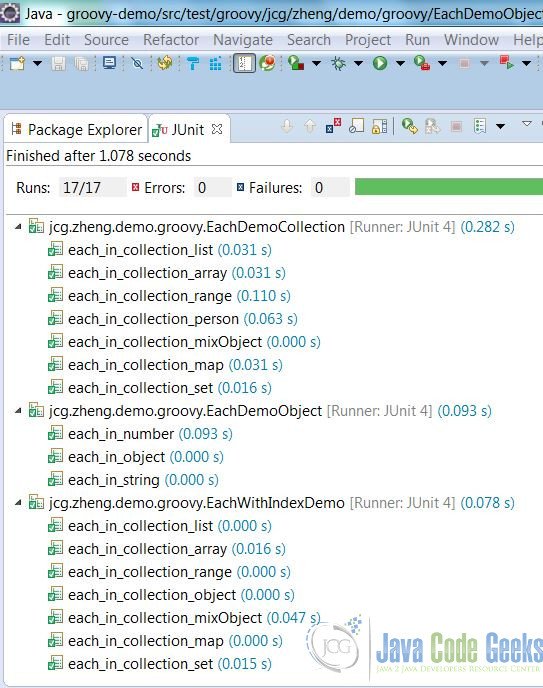Groovy Each Example
1. Introduction
Apache Groovy (Groovy) is an object-oriented dynamic programming language for the Java platform. It is dynamically compiled to the Java Virtual Machine (JVM) bytecode, and inter-operates with other Java source codes and libraries. Groovy is written in Java and was first released in 2007.
Groovy each and eachWithIndex methods are defined in Groovy Object, so we can use them for any object.
In this example, I will demonstrate how to use the Groovy each and eachWithIndex methods for various common object types in a Maven project.
2. Technologies Used
The example code in this article was built and run using:
- Java 1.8.101 (1.8.x will do fine)
- Maven 3.3.9 (3.3.x will do fine)
- Eclipse Mars (Any Java IDE would work)
- Groovy 2.4
3. Maven Project
In this step, we will build unit test classes to demonstrate the each method for String, int, long, Object, and a collection with various different items. I will also show how to use the eachWithIndex method in a collection.
3.1 Dependencies
We will add Groovy dependency in the pom.xml.
pom.xml
<project xmlns="http://maven.apache.org/POM/4.0.0" xmlns:xsi="http://www.w3.org/2001/XMLSchema-instance" xsi:schemaLocation="http://maven.apache.org/POM/4.0.0 http://maven.apache.org/xsd/maven-4.0.0.xsd"> <modelVersion>4.0.0</modelVersion> <groupId>jcg-zheng-demo</groupId> <version>1.0.0-SNAPSHOT</version> <artifactId>groovy-demo</artifactId> <build> <plugins> <plugin> <artifactId>maven-compiler-plugin</artifactId> <version>3.3</version> <configuration> <source>1.8</source> <target>1.8</target> </configuration> </plugin> </plugins> </build> <dependencies> <dependency> <groupId>org.codehaus.groovy</groupId> <artifactId>groovy-all</artifactId> <version>2.4.13</version> </dependency> <dependency> <groupId>junit</groupId> <artifactId>junit</artifactId> <version>4.11</version> <scope>test</scope> </dependency> </dependencies> </project>
3.2 Person
We will create a Person class to show the each method on an object.
Person.groovy
package jcg.zheng.demo.groovy
import groovy.transform.Canonical
@Canonical
class Person {
String firstName
String lastName
}
3.3 Each on an Object
public Object each(Closure closure): Iterates through an aggregate type or data structure, passing each item to the given closure. Custom types may utilize this method by simply providing an “iterator()” method. The items returned from the resulting iterator will be passed to the closure.
In this step, we will build unit tests to call the each method for String, number and Object.
EachDemoObject.groovy
package jcg.zheng.demo.groovy
import static org.junit.Assert.*
import org.junit.Test
class EachDemoObject {
@Test
public void each_in_string(){
String str = "Hello World!"
str.each { println it}
}
@Test
public void each_in_number(){
int num = 100
num.each { println it}
}
@Test
public void each_in_object(){
def person = new Person("Mary", "Zheng")
person.each { println it}
}
}Output of each_in_number for number 100.
Output from each_in_number
100
Output from each_in_string for “Hello World!”
Output from each_in_string
H e l l o W o r l d !
Output from each_in_object for a Person.
Output from each_in_object
jcg.zheng.demo.groovy.Person(Mary, Zheng)
3.4 Each for a Collection
In this step, we will build unit tests to invoke each method for a collection of list, map, set, and range.
EachDemoCollection.groovy
package jcg.zheng.demo.groovy
import static org.junit.Assert.*
import org.junit.Test
class EachDemoCollection {
@Test
public void each_in_collection_array(){
String[] names = ["Mary", "Becky", "Susan", "Tom"]
names.each { println it}
}
@Test
public void each_in_collection_list(){
List names = ["Mary", "Becky", "Susan", "Tom"]
names.each { println it}
}
@Test
public void each_in_collection_map(){
def names = [:]
names["id001"]= "Mary"
names["id002"]= "Alex"
names["id003"]= "Allen"
names["id004"]= "Sammo"
names.each { println it}
}
@Test
public void each_in_collection_range(){
def numbers = (1..10)
numbers.each { println it}
}
@Test
public void each_in_collection_set(){
Set names = new HashSet()
names.add("Mary")
names.add("Zheng")
names.each { println it}
}
@Test
public void each_in_collection_person(){
Person [] persons = [new Person("Mary", "Zheng"), new Person("Alex", "Zheng"), new Person("Allen", "Zheng")]
persons.each { println it}
}
@Test
public void each_in_collection_mixObject(){
def items = [new Person("Mary", "Zheng"), "this is string", 100]
items.each { println it}
}
}
Output of each_in_collection_array for an array of String.
Output from each_in_collection_array
Mary Becky Susan Tom
Output of each_in_collection_map for a map.
Output from each_in_collection_map
id001=Mary id002=Alex id003=Allen id004=Sammo
Output of each_in_collection_person for a List of Person.
Output from each_in_collection_person
jcg.zheng.demo.groovy.Person(Mary, Zheng) jcg.zheng.demo.groovy.Person(Alex, Zheng) jcg.zheng.demo.groovy.Person(Allen, Zheng)
Output of each_in_collection_mixObject for a collection with a Person, String and number.
Output from each_in_collection_mixObject
jcg.zheng.demo.groovy.Person(Mary, Zheng) this is string 100
3.5 EachWithIndex for a Collection
Groovy also defines eachWithIndex as the default method:
Object eachWithIndex(Closure closure): Iterates through an aggregate type or data structure, passing each item and the item’s index (a counter starting at zero) to the given closure.
In this step, we will create EachWithIndexDemo with eachWithIndex .
EachWithIndexDemo.groovy
package jcg.zheng.demo.groovy
import static org.junit.Assert.*
import org.junit.Test
class EachWithIndexDemo {
@Test
public void each_in_collection_array(){
String[] names = ["Mary", "Becky", "Susan", "Tom"]
names.eachWithIndex { name, i -> println "${i} = ${name}"}
}
@Test
public void each_in_collection_list(){
List names = ["Mary", "Becky", "Susan", "Tom"]
names.eachWithIndex { name, i -> println "${i} = ${name}"}
}
@Test
public void each_in_collection_map(){
def names = [:]
names["id001"]= "Mary"
names["id002"]= "Alex"
names["id003"]= "Allen"
names["id004"]= "Sammo"
names.eachWithIndex { name, i -> println "${i} = '${name}'"}
}
@Test
public void each_in_collection_range(){
def numbers = (1..10)
numbers.eachWithIndex { number, i -> println "${i} = ${number}"}
}
@Test
public void each_in_collection_set(){
Set names = new HashSet()
names.add("Mary")
names.add("Mary")
names.add("Zheng")
names.eachWithIndex { name, i -> println "${i} = '${name}'"}
}
@Test
public void each_in_collection_object(){
Person [] persons = [new Person("Mary", "Zheng"), new Person("Alex", "Zheng"), new Person("Allen", "Zheng")]
persons.eachWithIndex { name, i -> println "${i} = '${name}'"}
}
@Test
public void each_in_collection_mixObject(){
def items = [new Person("Mary", "Zheng"), "this is string", 100, 1000000L, true, 12.234,]
items.eachWithIndex { name, i -> println "${i} is ${name.getClass()}, content= '${name}' "}
}
}
We will only print out the each_in_collection_mixObject as an example.
Output from each_in_collection_mixObject
0 is class jcg.zheng.demo.groovy.Person, content= 'jcg.zheng.demo.groovy.Person(Mary, Zheng)' 1 is class java.lang.String, content= 'this is string' 2 is class java.lang.Integer, content= '100' 3 is class java.lang.Long, content= '1000000' 4 is class java.lang.Boolean, content= 'true' 5 is class java.math.BigDecimal, content= '12.234'
4. Demo
Execute all three unit tests and captured the screenshot:
5. Groovy Each – Summary
In this example, we demonstrated the each and eachWithIndex methods for String, number,Object, and a collection of list, map, set, and range.
6. Download the Source Code
This example consists of a Maven project which demonstrates the usage of Groovy each method for various object types.
You can download the full source code of this example here: Groovy Each Example




